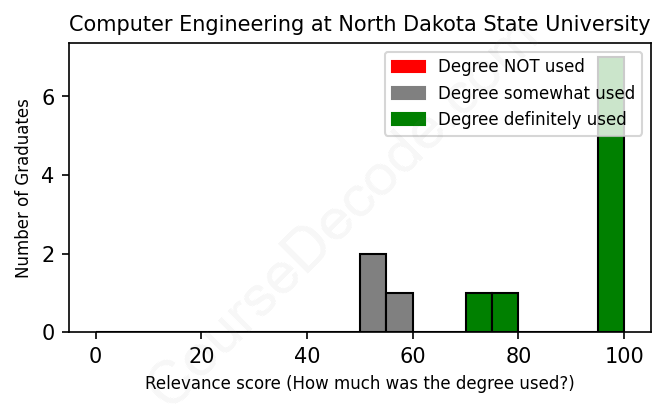
First, some facts. Of the Computer Engineering graduates from North Dakota State University we've analyzed , here's how many have used (or NOT used) their degree in their career:

These are estimates based on AI analysis of 12 LinkedIn profiles (see below).
The verdict? Significantly above average. Overall, with an average relevance score of 84%, Computer Engineering graduates from North Dakota State University have a much higher likelihood (+17%) of finding work in this field compared to the average graduate across all fields:
And for comparison, here's the chart for all profiles we've looked at across all degrees.
Also, after graduating, only 0% of these graduates have pursued further education other than another Bachelor's degree (such as a Masters degree or other), compared to the average across all profiles of 35%. This suggests a Bachelors degree is enough for most Computer Engineering graduates, and it's normal to look for work straight after graduation.
See the details:
|
Relevance score: 100% We think this person has gone into a career highly relevant to their degree. We think this person has gone into a career highly relevant to their degree.
DEGREE INFOGraduated in 2018 from North Dakota State University with a Bachelor of Science - BS in Computer Engineering. No other secondary education since. JOB HISTORY SINCE GRADUATIONSoftware Engineer I Honeywell Jun 2018 - May 2021 Software Engineer II  Honeywell May 2021 - Mar 2023 Advanced Software Engineer  Honeywell Mar 2023 - Present ABOUTI currently work as a Software Engineer in Electronic Solutions at Honeywell Aerospace. I graduated with a BS in Computer Engineering from North Dakota State University in May 2018. |
The top 10 most common jobs done by the graduates we've analyzed (ranked most common to least) are:
When looking at the job paths of recent graduates from North Dakota State University with a degree in Computer Engineering, it's clear that a significant number have found opportunities closely related to their field. Many of the roles focus on software engineering, embedded systems, and design engineering, indicating that a solid chunk of these grads are applying their technical skills in hands-on engineering contexts. Positions like Software Engineer at major companies like Honeywell and John Deere are not only common but showcase how well these graduates are leveraging their education in the tech-heavy job market.
However, there's also a noticeable mix of roles that stray from the core principles of computer engineering. Some graduates ended up in jobs like "IT Technician" or even roles outside the tech space, such as in apparel or teaching management. While these positions might utilize some technical skills, they don't fully capitalize on the comprehensive engineering training these students received. Overall, while many graduates are indeed working in relevant fields that align with their degree, there exists a variety of experiences that indicates not all are directly linked to the core concepts of computer engineering.
Here is a visual representation of the most common words in job titles for Computer Engineering graduates (this is across all Computer Engineering graduates we've analyzed, not just those who went to North Dakota State University):

Looking at the career paths of graduates from North Dakota State University who studied Computer Engineering, it's clear that many of them have landed solid jobs right after graduation. Typically, their first roles seem to be in positions like IT Tech or design engineering, which gives them a good mix of practical experience and skill development. Over the first few years, many move up the ladder, often transitioning into more specialized roles like Software Engineer or Embedded Software Engineer at well-known companies like John Deere and Honeywell. It's encouraging to see that most graduates stay in tech-related fields, contributing to things like software development, circuit design, and engineering management.
As we look at what these professionals are doing five to ten years after graduation, the trend of upward mobility continues. Many have progressed into senior or leadership positions within their companies, often taking on more responsibility and influencing projects at a higher level. For example, those who started as software engineers or embedded engineers have often reached senior engineer roles or lead positions. This indicates a promising trajectory in the tech industry for these graduates, showing that a degree in Computer Engineering from NDSU can indeed lead to fulfilling and stable careers in relevant fields. Overall, it seems like the majority are doing well and building successful careers in areas that closely align with their education and training.
Getting a Bachelor’s degree in Computer Engineering can definitely be challenging, and the program at North Dakota State University is no exception. It's got a solid mix of math, programming, and hardware courses, which means you’ll be diving deep into some pretty complex stuff. If you enjoy problem-solving and have a good grasp of math and science, you'll probably find it manageable, but be ready to put in some serious time and effort. Overall, it’s about on par with what you'd expect from a typical Computer Engineering program—definitely not a walk in the park, but also not impossibly hard if you're willing to work for it!
Most commonly, in the LinkedIn profiles we've looked at, it takes people 4 years to finish a Bachelor degree in Computer Engineering.
Looking at the jobs these North Dakota State University graduates have landed, it seems like they’ve mostly made pretty decent money, especially compared to national averages for new grads. Many of them started in solid entry-level positions but quickly climbed the ladder, moving from roles like IT Technician and Software Engineer I to higher-level positions like Engineering Lead and Senior Embedded Software Engineer. It’s clear that experience in fields like software and engineering pays off, and companies like John Deere, Honeywell, and Mortenson seem to offer good opportunities for growth and decent salaries along the way. So yeah, it looks like they're doing well financially, which is a good sign for you if you're thinking about going into engineering or tech!
Here is a visual representation of the most common words seen in the "about" section of LinkedIn profiles who have a Bachelor degree in Computer Engineering (this is across all Computer Engineering graduates we've analyzed, not just those who went to North Dakota State University). This may or may not be useful:

Here are all colleges offering a Bachelor degree in Computer Engineering (ordered by the average relevance score of their Computer Engineering graduates, best to worst) where we have analyzed at least 10 of their graduates:
| College | Score | Count |
|---|---|---|
 University of Florida University of Florida
|
95 | 18 |
 Michigan State University Michigan State University
|
94 | 10 |
 Brigham Young University Brigham Young University
|
94 | 10 |
 Penn State University Penn State University
|
92 | 14 |
 California Polytechnic State University-San Luis Obispo California Polytechnic State University-San Luis Obispo
|
91 | 14 |
 University of Central Florida University of Central Florida
|
90 | 14 |
 Georgia Institute of Technology Georgia Institute of Technology
|
90 | 14 |
 Purdue University Purdue University
|
86 | 34 |
 University of Illinois at Urbana-Champaign University of Illinois at Urbana-Champaign
|
86 | 30 |
 Iowa State University Iowa State University
|
86 | 25 |
 Texas A&M University Texas A&M University
|
85 | 17 |
 San Jose State University San Jose State University
|
85 | 16 |
 Clemson University Clemson University
|
85 | 14 |
 Dwarkadas J. Sanghvi College of Engineering Dwarkadas J. Sanghvi College of Engineering
|
85 | 10 |
 North Dakota State University North Dakota State University
|
84 | 12 |
 Savitribai Phule Pune University Savitribai Phule Pune University
|
83 | 25 |
 University of Mumbai University of Mumbai
|
82 | 43 |
 New Jersey Institute of Technology New Jersey Institute of Technology
|
81 | 11 |
 University of North Carolina at Charlotte University of North Carolina at Charlotte
|
79 | 11 |
 California State Polytechnic University-Pomona California State Polytechnic University-Pomona
|
76 | 11 |
 The University of Texas at Dallas The University of Texas at Dallas
|
76 | 18 |
 University of South Florida University of South Florida
|
69 | 10 |
 Gujarat Technological University, Ahmedbabd Gujarat Technological University, Ahmedbabd
|
55 | 13 |